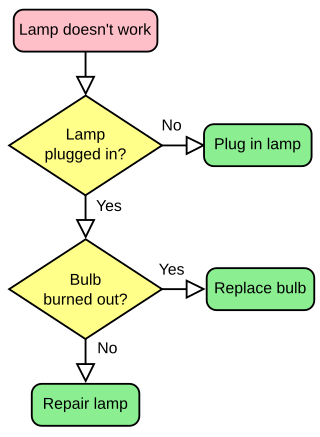Related Research Articles

Cognitive psychology is the scientific study of mental processes such as attention, language use, memory, perception, problem solving, creativity, and reasoning.

A cognitive bias is a systematic pattern of deviation from norm or rationality in judgment. Individuals create their own "subjective reality" from their perception of the input. An individual's construction of reality, not the objective input, may dictate their behavior in the world. Thus, cognitive biases may sometimes lead to perceptual distortion, inaccurate judgment, illogical interpretation, and irrationality.
A heuristic, or heuristic technique, is any approach to problem solving or self-discovery that employs a practical method that is not guaranteed to be optimal, perfect, or rational, but is nevertheless sufficient for reaching an immediate, short-term goal or approximation. Where finding an optimal solution is impossible or impractical, heuristic methods can be used to speed up the process of finding a satisfactory solution. Heuristics can be mental shortcuts that ease the cognitive load of making a decision.

Intuition is the ability to acquire knowledge, without recourse to conscious reasoning or needing an explanation. Different fields use the word "intuition" in very different ways, including but not limited to: direct access to unconscious knowledge; unconscious cognition; gut feelings; inner sensing; inner insight to unconscious pattern-recognition; and the ability to understand something instinctively, without any need for conscious reasoning. Intuitive knowledge tends to be approximate.

Daniel Kahneman is an Israeli-American psychologist and economist notable for his work on the psychology of judgment and decision-making, as well as behavioral economics, for which he was awarded the 2002 Nobel Memorial Prize in Economic Sciences. His empirical findings challenge the assumption of human rationality prevailing in modern economic theory.

In psychology, decision-making is regarded as the cognitive process resulting in the selection of a belief or a course of action among several possible alternative options. It could be either rational or irrational. The decision-making process is a reasoning process based on assumptions of values, preferences and beliefs of the decision-maker. Every decision-making process produces a final choice, which may or may not prompt action.

A decision support system (DSS) is an information system that supports business or organizational decision-making activities. DSSs serve the management, operations and planning levels of an organization and help people make decisions about problems that may be rapidly changing and not easily specified in advance—i.e. unstructured and semi-structured decision problems. Decision support systems can be either fully computerized or human-powered, or a combination of both.
Situational awareness or situation awareness (SA), that is, understanding an environment, its elements, and how it changes with respect to a time vector or other factors, is critical for appropriate and optimized decision making in many environments. It is formally defined as:
“the perception of the elements in the environment within a volume of time and space, the comprehension of their meaning, and the projection of their status in the near future”.
The overconfidence effect is a well-established bias in which a person's subjective confidence in their judgments is reliably greater than the objective accuracy of those judgments, especially when confidence is relatively high. Overconfidence is one example of a miscalibration of subjective probabilities. Throughout the research literature, overconfidence has been defined in three distinct ways: (1) overestimation of one's actual performance; (2) overplacement of one's performance relative to others; and (3) overprecision in expressing unwarranted certainty in the accuracy of one's beliefs.
Cognitive ergonomics is a scientific discipline that studies, evaluates, and designs tasks, jobs, products, environments and systems and how they interact with humans and their cognitive abilities. It is defined by the International Ergonomics Association as "concerned with mental processes, such as perception, memory, reasoning, and motor response, as they affect interactions among humans and other elements of a system. Cognitive ergonomics is responsible for how work is done in the mind, meaning, the quality of work is dependent on the persons understanding of situations. Situations could include the goals, means, and constraints of work. The relevant topics include mental workload, decision-making, skilled performance, human-computer interaction, human reliability, work stress and training as these may relate to human-system design." Cognitive ergonomics studies cognition in work and operational settings, in order to optimize human well-being and system performance. It is a subset of the larger field of human factors and ergonomics.
Gary Klein is a research psychologist famous for pioneering in the field of naturalistic decision making. By studying experts such as firefighters in their natural environment, he discovered that laboratory models of decision making could not describe it under uncertainty. His recognition-primed decision (RPD) model has influenced changes in the ways the Marines and Army train their officers to make decisions.
The naturalistic decision making (NDM) framework emerged as a means of studying how people make decisions and perform cognitively complex functions in demanding, real-world situations. These include situations marked by limited time, uncertainty, high stakes, team and organizational constraints, unstable conditions, and varying amounts of experience.
In psychology, a dual process theory provides an account of how thought can arise in two different ways, or as a result of two different processes. Often, the two processes consist of an implicit (automatic), unconscious process and an explicit (controlled), conscious process. Verbalized explicit processes or attitudes and actions may change with persuasion or education; though implicit process or attitudes usually take a long amount of time to change with the forming of new habits. Dual process theories can be found in social, personality, cognitive, and clinical psychology. It has also been linked with economics via prospect theory and behavioral economics, and increasingly in sociology through cultural analysis.
In psychology, the human mind is considered to be a cognitive miser due to the tendency of humans to think and solve problems in simpler and less effortful ways rather than in more sophisticated and effortful ways, regardless of intelligence. Just as a miser seeks to avoid spending money, the human mind often seeks to avoid spending cognitive effort. The cognitive miser theory is an umbrella theory of cognition that brings together previous research on heuristics and attributional biases to explain when and why people are cognitive misers.
Macrocognition indicates a descriptive level of cognition performed in natural instead of artificial (laboratory) environments. This term is reported to have been coined by Pietro Cacciabue and Erik Hollnagel in 1995. However, it is also reported that the term was used in the 1980s in European Cognitive Systems Engineering research. Possibly the earliest reference is the following, although it does not use the exact term "macrocognition":
A macro-theory is a theory which is concerned with the obvious regularities of human experience, rather than with some theoretically defined unit. To refer to another psychological school, it would correspond to a theory at the level of Gestalten. It resembles Newell’s suggestion for a solution that would analyse more complex tasks, although the idea of a macro-theory does not entail an analysis of the mechanistic materialistic kind which is predominant in cognitive psychology. Thus we should have a macro-theory of remembering rather than of memory, to say nothing of short-term memory, proactive inhibition release, or memory scanning. To take another example, we should have a macro-theory of attending, rather than a mini-theory of attention, or micro-theories of limited channel capacities or logarithmic dependencies in disjunctive reaction times. This would ease the dependence on the information processing analogy, but not necessarily lead to an abandonment of the information processing terminology, the Flowchart, or the concept of control structures. The meta-technical sciences can contribute to a psychology of cognition as well as to cognitive psychology. What should be abandoned is rather the tendency to think in elementaristic terms and to increase the plethora of mini-and micro-theories. ... To conclude, if the psychological study of cognition shall have a future that is not a continued description of human information processing, its theories must be at what we have called the macro-level. This means that they must correspond to the natural units of experience and consider these in relation to the regularities of human experience, rather than as manifestations of hypothetical information processing mechanisms in the brain. A psychology should start at the level of natural units in human experience and try to work upwards towards the level of functions and human action, rather than downwards towards the level of elementary information processes and the structure of the IPS.
Karol Girdler Ross is a leading scientist in decision-making research. She received her Ph.D. in experimental psychology from the University of Tennessee and is now a chief scientist for Cognitive Performance Group of Florida and a research psychologist at the Institute for Simulation and Training (IST) at the University of Central Florida. She is currently serving a two-year appointment on the U.S. Army TRADOC Distance Learning Training Technology Subcommittee of The Army Distributed Learning Program and serves on the Defense Regional and Cultural Capabilities Assessment Working Group-Learning Objectives Subgroup. She has conducted research and development for the US Army, the USMC, the US Air Force and the Office of Naval Research. Currently at IST, she provides senior scientist oversight for the USMC R&D Program for Cognitive Skills Training for IED Defeat. Her work currently deals with the oversight of extensive cognitive task analysis of IED Defeat performance, the development and evaluation of performance metrics, multiple training interventions, training effectiveness evaluation, and modeling of cross-cultural competence.
Heuristics is the process by which humans use mental short cuts to arrive at decisions. Heuristics are simple strategies that humans, animals, organizations, and even machines use to quickly form judgments, make decisions, and find solutions to complex problems. Often this involves focusing on the most relevant aspects of a problem or situation to formulate a solution. While heuristic processes are used to find the answers and solutions that are most likely to work or be correct, they are not always right or the most accurate. Judgments and decisions based on heuristics are simply good enough to satisfy a pressing need in situations of uncertainty, where information is incomplete. In that sense they can differ from answers given by logic and probability.
Illusion of validity is a cognitive bias in which a person overestimates their ability to interpret and predict accurately the outcome when analyzing a set of data, in particular when the data analyzed show a very consistent pattern—that is, when the data "tell" a coherent story.
Cognitive bias mitigation is the prevention and reduction of the negative effects of cognitive biases – unconscious, automatic influences on human judgment and decision making that reliably produce reasoning errors.
Intuition in the context of decision-making is defined as a "non-sequential information-processing mode." It is distinct from insight and can be contrasted with the deliberative style of decision-making. Intuition can influence judgment through either emotion or cognition, and there has been some suggestion that it may be a means of bridging the two. Individuals use intuition and more deliberative decision-making styles interchangeably, but there has been some evidence that people tend to gravitate to one or the other style more naturally. People in a good mood gravitate toward intuitive styles, while people in a bad mood tend to become more deliberative. The specific ways in which intuition actually influences decisions remain poorly understood.
References
- ↑ Crandall, Beth; Klein, Gary; Hoffman, Robert R. (2006) Working Minds: A Practitioner's Guide to Cognitive Task Analysis Cambridge, MA: MIT Press